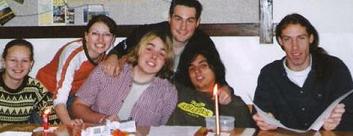
"East Europe 2005-06" story # 19
POSITIVES AND NEGATIVES OF TEACHING ENGLISH
Rymarov, Czech Republic
January 2, 2006
I really receive a warm feeling from people when they speak Czech with me. Many Czechs speak little or no English. Many other Czechs like speaking English, and usually they see me as an opportunity for themselves to get some practice.
One of my favorite people in Rýmarov is early-thirties hardy laborer Sdane, who looks like Christian Slater's brother and who I called "Král (King) Jaroslav" in another story. Recently at the bar, he looked at me with worn-down brown eyes and a faithful smile. "Justin, zatím ze ty jses byl v Rymarove, já nejsem naucil jeden slov od anglicky - proteze já jsem chtel ucit ti cesky." (Justin, in the time that you've been in Rymarov, I haven't learned one word of English - because I wanted to teach you Czech.)
(Sdane is also, incidentally, the only person I know who says he has "nostalgie" - a fond recollection - for the days of communism.)
I bring all of this up because I'd like to provide you - whoever you are - with an example of something negative experienced during my travels. The conflict is: I'd like to speak Czech while I'm here, but some Czechs will only speak English with me. (I apologize if this conflict is irrelevant to "whoever you are" - if that is, indeed, your name.) Of course, there are times when I'm happy people speak English.
It's a complicated conflict, difficult to reduce to its simplest terms. I guess I feel that when people speak Czech with me they are welcoming me as one of their own. When they insist on English, then they're willing to be taught by their guest's foreign culture but unwilling to show me theirs. Sometimes I feel like I have four-hundred students in Rýmarov but few good friends.
Maybe I'm totally wrong, but I like those as the simplest terms. The Czech insistent English-speakers may or may not be conscious of how they make me feel; but, I usually avoid them.
I've also been guilty of speaking Spanish in the U.S.A. to hispanics capable of speaking English. In the future, I will respect that they're my country's guests and comply better to their desires.
For now, I continue to contradictorily grumble about the Czechs' thirst for globalization while teaching them high school English. And I like teaching the high schoolers. There are a lot more positives than negatives.
On one Wednesday, a student made me laugh so suddenly I sprayed water. He was fourteen-year-old Roman, a Tunisian-skinned boy. He has brown eye stars and an adorable dimpled smile, and he turns his head flashingly between one side and the other searching for a friend who can translate what I just said. He made me laugh when I asked the class if they used to catch snails when they were young. He didn't say anthing; he made a motion with two hands as if he was skilfully pulling a poor snail apart from his shell, mouthed "Pop!", and sat smiling proudly.
The next day, I was asking Brona about her favorite movie, "Titanic." Nineteen-year-old, loveable Johnny - one of four excellent students in class - had to translate all my questions into Czech for her. I thought it would be funny if I changed things up and asked the questions in Czech. Johnny played along and translated them into English. However, slow Brona just stared at him, totally confused, and showed evidence she might never respond even if class were to last two weeks. Smiling Johnny and I sighed, he shook his head, our fun game was over, and he translated the question back into Czech.
The next morning, a girl said she dreamt a line of percotine was chasing her. That shouldn't be funny, she uses too many drugs, but I just love the personification of a line of percotine.
And on the last day I taught before Christmas, I tried teaching the kids American Christmas songs. Czech students love to sing. I tried teaching them "White Christmas," naive to the fact that that Bing Crosby was a hell of a singer. My voice hobbled on every other word: "... just like the ones I used to know!" The kids laughed.
And then, in contrast, the twelve girls and two boys took off singing Czech Christmas songs. It sounded soft and beautiful and merry and romantic. They sang, "Rolnicky, rolnicky, kdopak vám dal hlas?" (Czech "Jingle Bells") and the Czech "Silent Night" and some others. It was one of the highlights of Eng - hey! this is supposed to be English class! ... okay, just a few songs more ...

- Modern Oddyseus.
And may all your Christmases be white.
Thanks to Jarda; Robert; Kubabus; Zbynek; Thomas & Matthew Adam; and Daniel, Zvabatova, & Marek for the rides!
Much thanks to Andreka, Pavel, Cert, & the snowboarding instructors for the place to stay!
"Rolnicky, rolnicky,
kdopak vám dal hlas?
Kashpárek malický
nebo deda Mráz?
Rolnicky, rolnicky,
co to zvoní v nich?
Maminciny písnicky,
vánoce a sníh!"
- Czech "Jingle Bells"